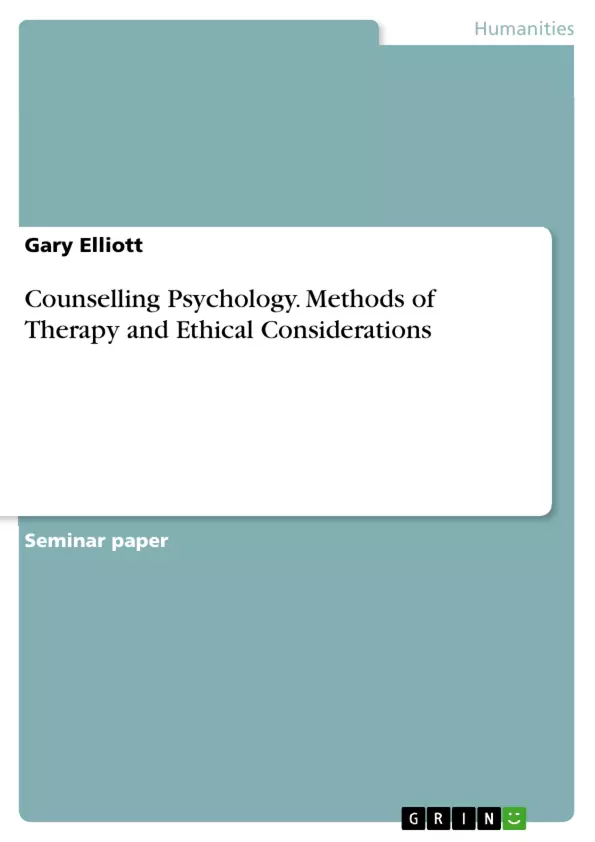This paper focuses on the theories and the techniques involved in counselling as well as the ethical issues related to counselling. Each therapy style is discussed individually in an attempt to supply a user-friendly approach to the similarities and differences in relation to each style of therapy.
The buzz term at the moment in counselling is Cognitive Behavioural Therapy, and while this technique of counselling has its merits it is important for us to open ourselves to the vast array of therapeutic styles. It is my opinion that a competent counsellor utilises a combination of counselling techniques to best serve the needs of the client. Having a thorough understanding of how each technique can add value to the counselling environment makes for a more productive and successful practice.
While each individual technique has its own application, it also has its own limitations in the counselling realm; these will be discussed in turn along with the implications and applications for multicultural counselling. In the South African field of counselling, along with numerous other countries in the world, the concept of multicultural sensitivity is of huge importance. Counsellors or therapists in this country will be exposed to clientele from many different cultural backgrounds and sensitivity to the application of a particular therapeutic approach to multicultural counselling is paramount.
Another important component of therapy is ethical practice. This concept goes beyond informed consent and client confidentiality and will be discussed later in this paper.
Table of Contents
- Introduction
- Psychoanalytic Therapy
- Adlerian Therapy
- Existential Therapy
- Person-centered Therapy
- Gestalt Therapy
- Reality Therapy
- Behaviour Therapy
- Cognitive Behaviour Therapy
- Family Systems Therapy
- Counselling with Ethics
- Conclusion
- References
Objectives and Key Themes
This paper explores the theories and techniques involved in counselling practice, focusing on ethical considerations. It aims to provide a user-friendly overview of various therapy styles, highlighting their similarities and differences. The paper emphasizes the importance of multicultural sensitivity in counselling and explores the concept of ethical practice beyond informed consent and client confidentiality.
- Theories and Techniques in Counselling Practice
- Ethical Considerations in Counselling
- Multicultural Sensitivity in Counselling
- Ethical Practice Beyond Informed Consent and Confidentiality
- Comparison of Different Therapy Styles
Chapter Summaries
- Introduction: This chapter provides an overview of the paper's focus on counselling theories, techniques, and ethical issues. It emphasizes the importance of a multifaceted approach to counselling and the significance of multicultural sensitivity.
- Psychoanalytic Therapy: This chapter explores the key concepts of Psychoanalytic Therapy, rooted in Sigmund Freud's work. It discusses the theory of personality development, the role of unconscious factors, and the five psychosexual stages of development: the oral stage, the anal stage, the phallic stage, the latent stage, and the genital stage. The chapter highlights how unresolved conflicts during these stages can influence personality development and manifest in later life.
Keywords
This paper explores key topics in counselling, including psychoanalytic therapy, ethical practice, multicultural sensitivity, cognitive behavioural therapy, and various therapeutic approaches such as Adlerian, Existential, Person-centered, Gestalt, Reality, and Behaviour therapy. It also emphasizes the significance of understanding and applying these concepts in a culturally diverse counselling environment.
Frequently Asked Questions
What are the main therapeutic styles in counseling?
Common styles include Psychoanalytic, Adlerian, Existential, Person-centered, Gestalt, Reality, Behaviour, and Cognitive Behaviour Therapy (CBT).
Why is multicultural sensitivity important in counseling?
Especially in diverse societies like South Africa, counselors must adapt their approach to respect and understand the client's cultural background for effective therapy.
What does ethical practice in counseling involve?
It goes beyond informed consent and confidentiality, encompassing professional boundaries, competence, and the moral responsibility to do no harm.
What is the focus of Psychoanalytic Therapy?
Rooted in Freud's work, it focuses on unconscious factors, personality development, and resolving conflicts stemming from psychosexual stages.
Should a counselor use only one technique?
The author suggests that a competent counselor utilizes a combination of techniques to best serve the specific needs of each individual client.
- Citation du texte
- Gary Elliott (Auteur), 2013, Counselling Psychology. Methods of Therapy and Ethical Considerations, Munich, GRIN Verlag, https://www.grin.com/document/275080



